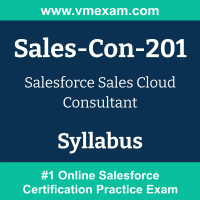 The Salesforce Sales-Con-201 exam preparation guide is designed to provide candidates with necessary information about the Sales Cloud Consultant exam. It includes exam summary, sample questions, practice test, objectives and ways to interpret the exam objectives to enable candidates to assess the types of questions-answers that may be asked during the Salesforce Certified Sales Cloud Consultant exam.
The Salesforce Sales-Con-201 exam preparation guide is designed to provide candidates with necessary information about the Sales Cloud Consultant exam. It includes exam summary, sample questions, practice test, objectives and ways to interpret the exam objectives to enable candidates to assess the types of questions-answers that may be asked during the Salesforce Certified Sales Cloud Consultant exam.
It is recommended for all the candidates to refer the Sales-Con-201 objectives and sample questions provided in this preparation guide. The Salesforce Sales Cloud Consultant certification is mainly targeted to the candidates who want to build their career in Salesforce Consultant domain and demonstrate their expertise. We suggest you to use practice exam listed in this cert guide to get used to with exam environment and identify the knowledge areas where you need more work prior to taking the actual Salesforce Sales Cloud Consultant exam.
Salesforce Sales-Con-201 Exam Summary:
| Exam Name | Salesforce Sales Cloud Consultant |
| Exam Code | Sales-Con-201 |
| Exam Price |
Registration fee: USD 200 Retake fee: USD 100 |
| Duration | 105 minutes |
| Number of Questions | 65 |
| Passing Score | 73% |
| Recommended Training / Books |
Prepare for Your Salesforce Sales Cloud Consultant Credential Essentials for New Lightning Experience Administrators (ADX201) Administer, Extend, and Automate Salesforce (ADX211) |
| Schedule Exam |
Kryterion Webassessor PEARSON VUE |
| Sample Questions | Salesforce Sales-Con-201 Sample Questions |
| Recommended Practice | Salesforce Certified Sales Cloud Consultant Practice Test |
Salesforce Sales Cloud Consultant Syllabus:
| Section | Objectives | Weight |
|---|---|---|
| Sales Lifecycle |
- Given business requirements, metrics, key performance indicators (KPIs), or business challenges, determine the optimal solution in Sales Cloud. - Given a scenario, discuss common sales and marketing processes and anticipate key implementation considerations. - Identify when to use Sales Cloud features and related products such as Sales Engagement, Salesforce Inbox, Enterprise Territory Management, Opportunity Forecasting, Sales Cloud Einstein, and generative/predictive AI. - Identify ways to transform business outcomes and sales KPIs into reports and dashboards. |
20% |
| Consulting and Implementation Strategies |
- Prior to an implementation, assess user experience, the communication plan, training, and change management, and establish metrics that measure success. - During an implementation, outline and apply appropriate deployment considerations. - Post implementation, determine how to respond to low adoption, changing business requirements, and user access, and plan for continuous improvement. - Leverage the project management lifecycle to deliver a successful solution on time and within scope. - Conduct discovery workshops, analyze business requirements, define solutions, and prioritize use cases. |
20% |
| Practical Application of Sales Cloud Expertise |
- Given a set of requirements, construct an end-to-end sales process within Salesforce that supports the business from Lead to Opportunity to Quote to Close. - Given a scenario, determine when it’s appropriate to extend declarative development with custom development, third-party applications, Salesforce products, or productivity tools (email integrations, Slack, Salesforce Mobile). - Given a set of business requirements, identify the appropriate security model (sharing rules, role hierarchy, Account Teams, Opportunity Teams, permission sets, permission set groups). - Outline the capabilities, use cases, and design considerations when implementing Opportunity Products, Products, Price Books, Quotes, and the impact of multi-currency. - Given a set of requirements, determine how to support different business and sales process scenarios for Campaigns, Leads, and Opportunities. |
23.3% |
| Data Management |
- Explain the use cases and considerations for data migrations and integrations. - Given a scenario, outline the scalability implications of a solution. - Discuss approaches for managing sales data quality in Salesforce. |
18.3% |
| Predictive and Generative AI |
- Understand what generative AI tools are available in Agentforce for Sales. - Understand what predictive AI tools are available in Sales Cloud. - Identify ethical challenges of AI and apply Salesforce’s Trusted AI Principles to sales scenarios. |
13.3% |
